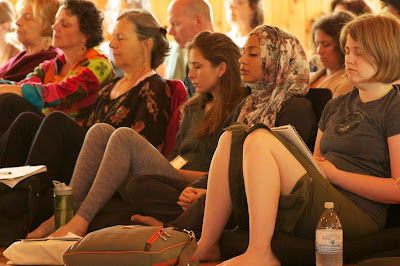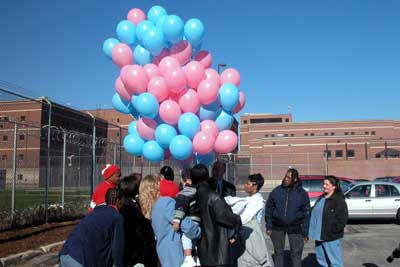
|
| Omega cabins (photo via SJ Times) |
Of course, I know that’s grandiose: The yoga world is hugely diverse, and there’s undoubtedly lots of other important work happening. Nonetheless, for someone with my particular combination of interests – integrating yoga with cutting-edge scientific research, sharing it with underserved communities, and adapting the practice to work in public institutions including prisons, hospitals, and schools – the Yoga Service Council (YSC) conference is as good as it gets.
Having attended the inaugural YSC conference last year, it was exciting to see its growing capacity and momentum. Both the 2012 and 2013 conferences featured impressive keynote speakers, a variety of excellent workshops, and evening “meet and greet” sessions. This year’s gathering additionally included 30 YSC scholars who had been awarded scholarships to attend the conference, a mostly youthful group whose inclusion benefitted the entire event by increasing its demographic and cultural diversity.
American yoga service organizations work with an estimated 150,000-200,000 people annually, including abused women, prisoners, at-risk children and teens, veterans, cancer patients, and the homeless. The Yoga Service Council serves as the organizational hub for this growing movement, with the annual conference sharing the work of some of the most visionary leaders in the field. With conference goers split more or less evenly between full-time yoga teachers and a variety of professionals including nurses, social and mental health workers, teachers, and researchers, it’s an exceptionally interesting and well-informed group. They’re also fun to hang out with, as the shared commitment to yoga service creates an easy sense of camaraderie and community.

|
| YSC conference, June 2013 (photo courtesy of Omega Institute, eOmega.org) |
“From Inspired to Effective”
Yoga service work is inspiring, and attracts energetic, passionate people. As a new field that's generally underfunded, however, workers run the risk of burnout. As the conference program brochure explained:
We’ve seen it many times before: a yoga teacher, after a year of volunteer service, finds she and her boyfriend are $1,800 behind in mortgage payments and she needs to give up the all-important Seva opportunity. Or, personally and professionally, the effort of an Executive Director to manage a nonprofit outreach organization brings about compassionate burnout. To be effective, engagement and service must happen in a way that is sustainable.Sustainability requires both supporting individual practitioners and building solid organizations. This means that yoga service providers should take time for self-care, a need that’s often neglected among people who feel driven to help others. It also requires organizational capacity building, most notably raising revenue to support teachers and staff members, access appropriate training, and secure needed equipment.
This year’s YSC conference was designed to support individuals and organizations by providing a experience of community that was both nurturing and educational. The schedule unfolded at a nice pace, opening with a relaxed evening address by Beryl Bender Birch on “Awakening to Spiritual Revolution: The Convergence of Practice and of Activism.” The following morning kicked off with an excellent asana practice led by "Yoga for 12-Step Recovery" founder Nikki Myers. After this, there was ample time to enjoy a healthy, sustaining breakfast in Omega’s beautiful dining hall before reconvening for the Saturday morning keynote.

|
| Asana at YSC conference (photo courtesy of Omega Institute, eOmega.org) |
“Strengthening Compassion”
If you think that listening to a lecture on a sunny Saturday morning sounds unappealing, please reconsider. Kelly McGonigal, Ph.D., delivered a 90-minute talk on “Strengthening Compassion” that was not only fascinating, but also genuinely enlightening. Based on an 8-week training program developed at Stanford University where she serves as a lecturer, Kelly gave us a powerful briefing on the nature of compassion based on Buddhist meditation practices and spiritual philosophies, as well as neuroscience, social psychology, and evolutionary biology.
Kelly described compassion as having four key elements:
- recognition of suffering,
- feelings of concern and connection,
- a desire to relieve suffering, and
- the willingness and ability to respond.
Kelly presented specific techniques we can use to strengthen our ability to be in the presence of suffering without falling into reactive feelings of threat and overwhelm. “Compassion,” she emphasized, “is a set of skills that can be trained.” We should not expect compassion to be an unlimited resource that we can continually draw out of ourselves without taking time to replenish it. Continuing the conference’s theme of connecting self-care to caring for others, she urged yoga service providers not to romanticize compassion, but rather understand the concrete practices that help it grow, as well as the everyday scenarios that restrict it.

|
| Dr. Kelly McGonigal (photo courtesy of Omega Institute, eOmega.org) |
An Abundance of Offerings
After the Saturday morning keynote, conference participants were offered a choice of five workshops including yoga and recovery from addiction, working with high-risk youth, building a wellness toolkit, asana sequencing, and conducting research. I attended Nikki Myer’s presentation on addiction recovery, which was excellent.
After the workshops, it was time for lunch. Meals at Omega are really nice, featuring an old-fashioned buffet and communal tables both inside the spacious dining hall, outside on the porch, and down the hill on the grass. The YSC conference also set up tables where people could discuss topics including diversity, nonprofit development, and international service work. After lunch, Sharon Salzberg, a renowned Buddhist meditation teachers, led a practice dedicated to deepening our capacities for concentration, connection, fearlessness, and genuine happiness.
Afternoon workshops included “Yoga for Cancer Survivors,” “Mindfulness-Based Elder Care,” “Sustainable Yoga Service,” “Individual Practices to Support Yoga Service,” and “Yoga-Based Mindfulness Programs for Women Trauma Survivors.” Saturday evening featured the “poster session,” which provided a much-appreciated opportunity to learn about the yoga service organizations represented at the conference, and make connections with interesting, passionate, and friendly practitioners from all over the country.
The next morning, Dr. Bessel van der Kolk, M.D., a leading expert on trauma, presented a fascinating lecture on “Yoga, Neurobiology, and Trauma," which expertly synthesized information from yoga, history, neuroscience, and psychology. Following his presentation, the conference segued into a panel discussion on “Diversity and Cultural Awareness” in the yoga service movement. While an important addition to the program, the one hour provided wasn't enough to adequately address the complex issues this topic inevitably invokes. Hopefully, more time will be allotted to continue this discussion next year.

|
| Dr. Bessel van der Kolk (photo courtesy of Omega Institute, eOmega.org) |
Non-Dualism for Our Times
In one action-packed, yet restful and energizing weekend, I experienced the integration of self-care and organization building, neuroscience research and meditation practice, the Yoga Sutras and addiction recovery, and asana practice and social outreach – to name just a few examples. Such creative couplings, I believe, represent invaluable new ways of realizing traditional yogic practices of non-dualism in the real-world context of life today.
Whether you’re involved with yoga service or not, I’d encourage anyone interested in deepening their practice to consider attending next year’s conference. After all, there's ultimately no division between serving our selves and serving others. Yoga service simply means becoming more deliberate about the natural process of progressively realizing our interconnectedness through mindful practice.
In sum, the Yoga Service Council conference is generating an exceptionally promising new wave of yoga in the West. I hope that more and more practitioners will be inspired to join the movement, and help build its momentum. If you're looking for an opportunity to make your practice more informed, intelligent, socially relevant, and personally meaningful, consider joining like-minded friends out at Omega next year.

|
| Omega lakeshore sculpture (photo credit: Ken Wieland) |



